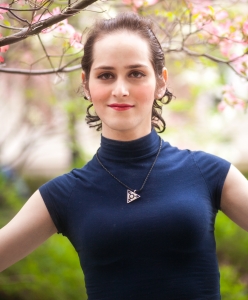On February 20th, Goucher Hillel brought activist Abby Stein to come speak with the college community.

Photo Credit: Google Images
During her talk in the Hyman Forum, Stein told us about her life on the inside of the Hasidic community of Williamsburg, Brooklyn. (For some reference, think of Fiddler on the Roof.) She informed us how she was taught that “T.V. is the devil,” and that men and women should occupy entirely separate spheres of the Hasidic community.
Socialized as a man for the first twenty years of her life and born into a royal bloodline, Stein was trained as a rebbe for the Hasidic community shortly after her arranged marriage at age 19. She left the community in 2012, and came out as a transgender woman in 2015. She spent a significant part of her talk describing the schooling system within the Hasidic community, pointing out that only girls were taught any English growing up. While boys were expected to study the Talmud, requiring them to only need to know Hebrew and Yiddish, most girls worked in the larger Brooklyn area once married. Despite this, the secludedness of the community ensured that the prevailing languages spoken were Hebrew and Yiddish. Stein underscored this point when she said that after leaving the community it was as if she was an “immigrant to [her] own country,” despite having been born and raised in New York.
One of Stein’s slogans is “refusing to shut up.” A part of this includes educating people on Hasidism without bashing individuals within the community. I learned that being a rebbe is different from being a rabbi in that Stein remarked that rebbes are considered the “political, spiritual, and financial leader” of the community. She likened the community’s structure to that of a monarchy, and commented that “[gender] roles are set in stone.” That she herself was a rebbe within this incredibly insular community made this ethnographic approach more accessible to me. Instead of feeling the need to defend any aspect of Judaism, I could simply appreciate Stein’s critique of the tradition she was raised in.
An engaging speaker, Stein felt approachable. She sidestepped the subject of how to be a good ally, and instead challenged us as audience members to listen to her story without needing to make it about us instead. She spent an hour telling us the story of her life, and an hour after that answering questions from the audience about almost anything under the sun. Stein made it clear that she does not have all the answers to how we can build a more welcoming world on a large scale, but she does know that the self-made choice to come out is worth celebrating.
So, what? Why should we care? What if you aren’t queer, or Jewish, or both? Callie Hamm, ‘21, summed it up simply: “anybody from any background can get something out of it.”
Here are a few of the resources Stein highlighted in her talk:
- Her website, http://thesecondtransition.blogspot.com/ includes her blog and a plethora of Jewish- and queer-centric resources
- Watching YouTube videos of trans people talking about their identities
- One of Us on Netflix
- Follow her on Instagram @abbychavastein
In addition to bringing speakers to campus from time to time, Goucher Hillel hosts a free Shabbat dinner every Friday night, and all are welcome to attend. Want to know more about Abby Stein, Jewish life on campus, or are interested in being a part of a Jewish and Queer affinity space? Feel free to email me at nelev001@mail.goucher.edu.
NEVE LEVENSON
